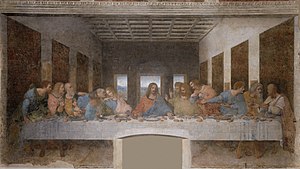Apostles
primary disciples of Jesus in the New Testament
(Redirected from Apostle)
In the New Testament, the Apostles were the primary disciples of Jesus, the central figure in Christianity.

| This Christianity-related article is a stub. You can help out with Wikiquote by expanding it! |
Quotes
edit- Polycarp replied to Marcion, who met him on one occasion, and said, "Do you know me?" "I do know thee, first-born of Satan." Such was the horror of the apostles and their disciples had against holding even verbal communication with any corrupters of the truth.
- Irenaeus, Against Heresies Book 3, Chapter 3 from Readings in World Christian History (2013), pp. 58-99
- I have learned by experience that there is but one God that pertains to this people, and He is the God that pertains to this earth-the first man. That first man sent his own Son to redeem the world, to redeem his brethren; his life was taken, his blood shed, that our sins might be remitted. That Son called twelve men and ordained them to be Apostles, and when he departed the keys of the kingdom were deposited with three of those twelve, viz.: Peter, James, and John. Peter held the keys pertaining to that Presidency, and he was the head.
- Heber C. Kimball Journal of Discourses 4:1 (June 29, 1856)
- I was born Jewish. I received the name of my paternal grandfather, Aaron. Having become Christian by faith and baptism, I have remained Jewish. As did the Apostles.
- Jean-Marie Cardinal Lustiger requested epitaph, quoted in The Economist obituary, August 18th 2007, p. 76
- Since the first ordained Lutheran pastors were ordained by pastors who had been ordained in the Roman Catholic church and so on through the generations, we could claim historic succession as plausibly as can Roman Catholic priests if it simply were dependent on being ordained in a line of pastors. But for the historic succession to be considered legitimate by Rome or the Orthodox or Anglicans it must be mediated through the correct bishops. Rome does not recognize as legitimate even the ordinations done by bishops in historic succession as in the Church of Sweden and the Church of England. Only through bishops connected to the pope is the historic succession legitimate in their eyes.
- Wisconsin Evangelical Lutheran Synod "Definition of Church and Ministry - Apostolic Sucession". WELS Topical Q&A. Wisconsin Evangelical Lutheran Synod. Archived from the original on 29 June 2008. Retrieved 23 Sep 2015.
- God has exhibited us apostles as last of all, like men sentenced to death, because we have become a spectacle to the world, to angels, and to men. We are fools for Christ's sake, but you are wise in Christ. We are weak, but you are strong. You are held in honor, but we in disrepute. To the present hour we hunger and thirst, we are poorly dressed and buffeted and homeless, and we labor, working with our own hands. When reviled, we bless; when persecuted, we endure; when slandered, we entreat. We have become, and are still, like the scum of the world, the refuse of all things.
- We believe it would not be right for us to administer either Baptism or the Lord's Supper unless we had a commission so to do from those Bishops whom we apprehend to be in a succession from the Apostles.
- John Wesley, A.D. 1745 [John Wesley in Company with High Churchmen [Parallel Passages, Selected] by an Old Methodist [H.W. Holden]. Church Press Company. p. 57. Retrieved 10 June 2013.]